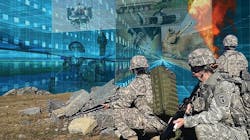Army investigates the role of artificial intelligence on sensor processing, Next Generation Combat Vehicle
PITTSBURGH – Predictive maintenance, long-range precision fires, and the Next Generation Combat Vehicle are primary focuses of the U.S. Army Artificial Intelligence (AI) task force. Kris Osborn at Warrior Maven reports. Continue reading original article
The Military & Aerospace Electronics take:
24 Sept. 2019 -- Army Col. Douglas Matty is deputy director of the Army Artificial Intelligence (AI) Task Force, which performs its technical work at the Carnegie Mellon University National Robotics Engineering Center in Pittsburgh.
In a question-and-answer interview, Matty says the Army is looking into what might be possible with artificial intelligence, and how new technologies in this area could influence warfighter performance on the battlefield.
Existing and future technology demonstrations could involve unmanned aerial vehicles and their role in sensor processing, exploitation, and dissemination.
John Keller, chief editor
Military & Aerospace Electronics
